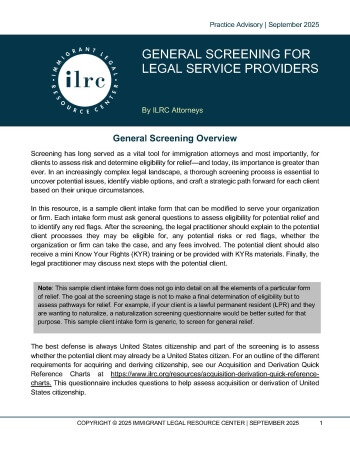This practice alert provides a summary of Flores v. Sessions, a recent Ninth Circuit decision that held that all detained children have the right to a bond hearing. It discusses why Flores v. Sessions was necessary, what its impact may be for detained youth, and details practice tips for advocates representing detained children seeking bond hearings.
Cal. P.C. § 261.5(c) is not an aggravated felony, but the law may change for the worse on § 261.5(d)Esquivel Quintana v. AG Sessions (May 30, 2017)
This practice advisory is designed to introduce legal workers to the T visa. It outlines T visa eligibility requirements, discusses the advantages of applying for T visas over other forms of humanitarian immigration relief, and analyzes how President Trump's recent executive orders impact T visa applicants.
Immigrants who are alleged to be involved with gangs are top immigration enforcement priorities for the Department of Homeland Security (DHS). This is true even if they have no criminal convictions and DHS is targeting them based on allegations alone. If such individuals choose to apply for immigration benefits, they may be exposing themselves to serious risk. This practice advisory discusses what gangs and gang databases are, how allegations of gang membership arise in immigration cases, the over-inclusive process law enforcement employs to allege gang membership, and strategies to identify whether your client may be labeled a gang member or associate. The purpose of this advisory is to help immigration advocates better understand how law enforcement in the United States documents and alleges gang membership or association, such that advocates are able to identify red flags in cases, and are better prepared to work with clients to assess possible risks in filing for relief.
This practice advisory reviews options for naturalization applicants who cannot afford the filing fee for the Form N-400, Application for Naturalization: the reduced fee option (Form I-942) and the USCIS fee waiver (Form I-912). The practice advisory also provides resources and tips for completing either application.
The immigration statute designates certain types of crimes as “aggravated felonies.” See INA § 101(a)(43), 8 USC § 1101(a)(43). These are the most dangerous type of convictions for a noncitizen. Despite the name, this definition reaches offenses that are neither felonies nor aggravated. It can include selling $10 worth of marijuana, a misdemeanor shoplifting offense with a one-year suspended sentence, or failure to appear at a criminal hearing. The person must be convicted of the offense, not merely commit it, for aggravated felony penalties to apply.
This advisory describes how practitioners with clients whose DACA renewal is outside of processing time or whose biometrics appointment notice is delayed can elevate their cases for resolution with USCIS.

This resource is a comprehensive client intake form meant to assist practitioners in screening for immigration relief options and assessing red flags. Accompanying the intake form are notes to assist practitioners in spotting issues and relief options as well as a summary of common forms of relief. This sample client intake form is generic, to screen for general relief since the goal at the screening stage is not to make a final determination of eligibility but to assess pathways for relief.
A noncitizen who is convicted of a “crime of domestic violence” is deportable. INA 237(a)(2)(E)(i), 8 USC 1227(a)(2)(E)(i). In Matter of H. Estrada the BIA reaffirmed that the categorical approach must be used to determine that the offense is a “crime of violence” under 18 USC § 16, but it held that the circumstance-specific approach can be used to determine whether the victim and defendant shared the required domestic relationship. Under that approach, the BIA found that ICE can use any reliable evidence, including evidence from outside the record of conviction, to try to meet its burden of proving the relationship.
In this practice advisory developed in consultation with the staff of the Judicial Council of California, we answer common questions about basic procedural and substantive issues that may arise in family court custody cases when SIJS findings are being requested.